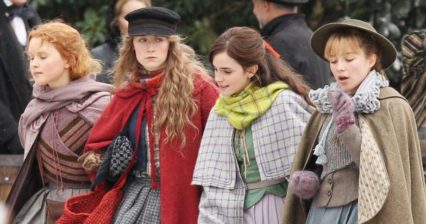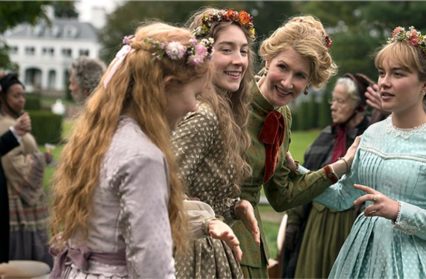Caragh Medlicott explores the power of Louisa May Alcott’s Little Women, and how Greta Gerwig’s latest movie adaptation builds and modernises this classic popular story.
When a reluctant Louisa May Alcott wrote Little Women at the request of her publisher in 1868, she could not have foretold the passion she’d instil in countless generations of readers, or the innumerable multi-media adaptations her text would inspire. Greta Gerwig is far from the first to bring this classic tale to the screen, but she’s certainly noteworthy for doing so with such flair, vibrancy and obvious devotion to the source material. Previous takes on Little Women have more frequently been sanitised and stuffy, rather than ardent and alive. As many hopefully projected, Gerwig’s version pays homage to the radical heart of Alcott’s text, and indeed, to Alcott herself.
For the uninitiated, Little Women follows the four March sisters torn between waning childhood and the looming responsibility of marriage and money. In Alcott’s original, the first volume centred around the genteel poverty of the March family enduring in the absence of their father serving in the American Civil War. The second volume (written and published after the immediate commercial success of the first) focuses on adulthood resolutions. Gerwig’s adaptation picks up in the in-between of these two narrative threads; she gives a jolt to the plodding narrative of the archetypal coming-of-age tale with a series of flashbacks that run parallel to the events of the present day.
Little Women’s cast is befitting of the characters in Alcott’s original: Saorise Ronan is a passionate and windswept Jo, Emma Watson a mild-yet-reliable Meg, Eliza Scanlen is sickly and sweet (but never sickly sweet) as Beth, while Florence Pugh plays an Amy so perfect the only criticism can be her far-too-perfect nose. With so many colourful characters to paint and authentic relationships to relay, this ensemble cast is essential to Little Women’s narrative arsenal.

One of the film’s greatest feats is the creation of real, family moments; ones that are not 2-D and thoughtful, but layered, noisy, oblivious in their love and joyousness. As anyone with siblings can attest to, affectionate childhood moments are more frequently shared in boisterousness, in silly games or petty fights. Gerwig understands her heroines; any modern take on this classic text must work to bring out the fully-fledged characters behind the singular virtues commonly associated with Alcott’s March sisters.
Gerwig similarly brings a new texture to the characterisation and dynamic of family relations. Amy is particularly of note – while sometimes shallow, and always strong-willed, Pugh is an authentic antidote to the infamously least-liked sister. Little Women’s narrative naturally pivots around aspiring-turned-successful writer Jo (a well-known fictionalisation of Alcott herself), yet it is not Meg or Beth who take the second position, but Amy who shines nearly as brightly. The film quickly establishes Jo as the feisty sister, full of passion and sometimes emotional to a fault, but Amy – driven by a different set of aspirations – is equally headstrong. Timothée Chalamet (who – like Ronan – is a Gerwig graduate from the director’s solo debut Lady Bird) is the March sisters’ petulant neighbour Laurie. Though he is given plenty of screen time, Laurie often pales in contrast to his two prospective love interests. Still, Laurie’s role is vital in the girls’ lives, for he is rich, and he is a man.
The necessity of marriage is one of the pressing concerns of Little Women. The March family have lost status and money, with the old and embittered Aunt March (Meryl Streep) their only remaining wealthy relative. Of course, they do not live in poverty – in fact, they still have a maid. Instead, their misfortunes manifest in a lack of fine things. This is an embarrassing problem for they are still living on the fringes of high society (a society where the dress you wear to a dance matter a great deal). The charity of the March girls’ mother, Mary (Laura Dern), serves to illuminate the real destitution of poor families living in conditions rife with disease and little food. Pleasantly, Gerwig’s depiction of this emits the plain didacticism of the novel. Even so, as Aunt March frequently points out, for a comfortable life the girls are expected to marry rich.
Women’s spaces, both literally and socially, are incredibly important here. Flashbacks show the family home overrun by women; the domestic home becomes a haven for stories, artistry, and mischief. Yet the girls’ control over their futures presides with their marriage prospects. For Jo, in particular, this is a horrendous and scary injustice.
More than once in the film, Jo draws attention to genuine laws from the mid-1800s (ones that placed all power and possession with husbands alone). While initial hopes of marital wealth are pinned on Meg – being the prettiest and eldest sister – when her head is turned by a poor school tutor, Jo is upset not because of his lack of status, but by the idea of losing her sister. In a widely circulated scene, Ronan delivers a moving monologue agonised by her simultaneous isolation, yet determination to remain free and independent. Ultimately, her biggest frustrations lie in the perceptions of society; as she says, “I’m so sick of people saying love is all a woman is fit for”.
There is a lingering question for any Little Women fan watching Gerwig’s adaptation – and that is the management of the ending. Gerwig is a feminist director and writer, handling a feminist text, yet she also has a love of the original text in its entirety (even if one might suspect Alcott’s ending more accurately reflected the wishes of her publisher). Out of this quandary, Gerwig delivers one of her biggest wins; a tactful and true take on the original, with a clever nod to the irony of such an ending. Here, Alcott’s fictional story, and her real-life story, intersect. The final scenes of Jo’s writing could as easily be a representation of Alcott’s own crafting of Little Women – a pursuit which really did take place inside her family home.
Gerwig’s Little Women is that rare thing, a film that retains all the warmth of the original book, whilst still being independently brilliant. Alexandre Desplat’s score captures small flashes of the exuberance in March family life, and a strong, felicitous cast bring many laughs and tears along the way. Gerwig was not recognised at this year’s Golden Globes, a highly ironic fact considering the film’s content. We may hope to see this amended in upcoming nominations. Still, regardless of the outcome, this film – like Jo – remains passionately brilliant.
The trailer for Greta Gerwig‘s Little Woman is available here.
Caragh Medlicott is a columnist and associate editor of Wales Arts Review.



 Enjoyed this article? Support our writers directly by buying them a coffee and clicking this link.
Enjoyed this article? Support our writers directly by buying them a coffee and clicking this link.








